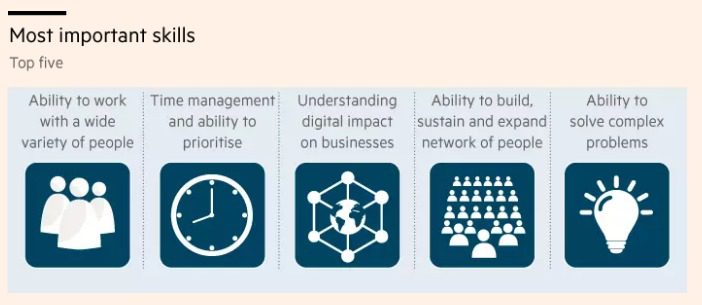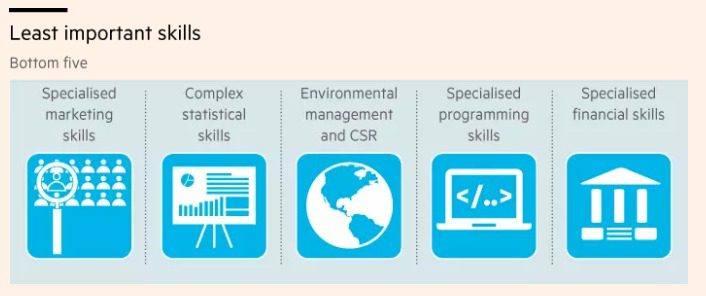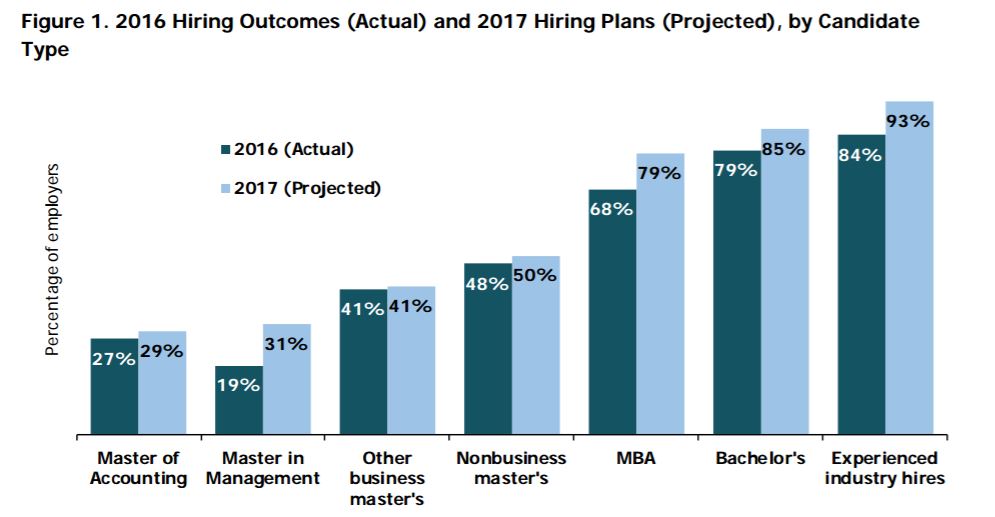What Employers Do and Don’t Look for In An MBA Graduate

Earning an MBA can often be a huge boost for graduates entering the job market, from opportunities for upper-level management roles to increased salaries.
But securing that job post-graduation can still be an uphill climb. Even with an MBA, students often find themselves struggling to understand how they fit within a changing job market. As the market continues to shift, understanding exactly what employers are looking for in their MBA applicants—and what they aren’t looking for—can be crucial for graduates as they search for and apply for their perfect job.
Thankfully, a recent survey from the Financial Times looked at the job market from the perspective of employers: what they are in need of in terms of MBA job seekers, and how MBA applicants can be more realistic regarding for the roles for which their new degree will qualify them. Unfortunately for many MBAs, the survey results may come as a surprise when they reflect on what skills they hoped their degree would offer in the first place. Yet, a critical understanding of what employers are and aren’t looking for can help job seekers re-frame the way they understand themselves and their prospective careers.
What Employers Want
The survey looked into the most important skills that employers look for in new MBA talent. Perhaps surprisingly, the five most important skills determined by the survey were actually not core MBA subjects. “Soft skills,” such as the ability to prioritize (desired by 72 percent of employers), the ability to work with a variety of people (76 percent of employers), and the ability for employees to effectively manage their time were the most desired and difficult to find, according to the survey.
The most difficult skills to recruit—the skills companies are sorely in need of—were most commonly named as the ability to use social media for the business’ needs, financial forecasting, big data analysis, brand storytelling skills, and the ability to train others.

The five most important skills, according to the Financial Times survey.
What Employers Don’t Want
The least important skills for an MBA, according to the survey, were those most often thought of as “hard skills,” such as specialized skills in marketing, finance, programming, or complex statistical skills. Similar skills were mentioned as the least difficult skills to recruit—the ability to solve complex problems and specialized marketing skills are often seen as common fare among MBA graduates and therefore a candidate with such skills won’t necessarily stick out.
Many surveyed employers said that past experience with MBA-holding employees had left them disappointed, with the degree-holder having difficulty turning concepts into practice. Many employers said that, while an MBA degree may be a nice bonus for a job candidate, the overall hiring decision is more based on the individual’s industry qualifications, rather than their degree.

These skills may be less necessary than MBA grads anticipate.
What Do You Need To Do?
So far, the results of the Financial Times survey may be disappointing for MBAs who have worked hard for their business education. No need to get concerned just yet, however. The employer response may have less to do with the idea that the skills of an MBA grad aren’t necessary in a company and more to do with a perception gap; the belief that business schools will not teach students the skills they need, and therefore that they do not need MBAs at their company.
Most of the work in convincing a skeptical employer your degree is worthwhile is simply convincing them that the skills learned as part of your degree are the same ones they desire. Many business schools are attempting to change the way MBAs are perceived and the type of skills that are associated with graduates. Julie Morton, Associate Dean of Careers Services and Corporate Relations at Chicago’s Booth School of Business, has already set half of her team to the work of promoting the value of MBA-holders in the workforce. Overall, much of the work will fall on business schools to market their graduates as holding the skills most desired by recruiters.
On a more individual level, however, the survey results also indicate that MBA grads can be more judicious in the roles that they apply to and the way they market themselves to potential employers. By focusing on the skills desired most—and the hardest to recruit—and ensuring that employers know these are the exact skills an MBA education offers, both employer and employee can benefit.
MBA Hiring Projections: It’s Time To Go To Business School

If you’re growing weary of all the MBA data forms and essays and interviews and anxiety—keep your eyes on the prize! That light at the end of the tunnel? Well, recent hiring projections from the Graduate Management Admission Council (GMAC) suggests it just keeps getting brighter.
Each November, GMAC conducts a short year-end poll of employers, asking them to reflect on what business school graduate hiring actually looked like that year and what they anticipate hiring to look like in the year ahead. GMAC’s most recent Year-End Poll of Employers Report, released yesterday, paints a promising picture of hiring trends for upcoming crops of graduating MBAs.
“We continue to see optimism—companies are still optimistic about the future, and they are expressing that in their desire to hire business school graduates,” says GMAC Director of Research Gregg Schoenfeld, one of the report’s author. “The overall message here is that it is a good time to go to business school and, from prospective candidates’ perspectives, it’s a good time to move forward on that goal to apply.”
Indeed, nearly eight out of every 10 employers (79 percent) say they expect to hire MBA graduates in 2017. That’s up from the 68 percent who hired MBAs in 2016. Of those planning to hire MBAs in 2017, almost as many (78 percent) say they plan to hire as many or more MBAs as they did the year before.
Not only do more employers expect to welcome MBAs into their ranks—the majority plan to pay them more as well. More than half—58 percent—said they expect to increase starting salaries for MBAs in 2017 at or above the rate of inflation. Another 40 percent report that they will maintain 2016 salary levels.
Explaining this bullishness, in part, is employers’ confidence in the value MBA graduates bring. In the most recent poll, 96 percent of responding recruiters said that hiring recent business school graduates creates value for their companies. And 71 percent cite bringing on MBAs and non-MBA business master’s graduates as a priority in their hiring plans.
GMAC’s 2016 Year-End Employer Poll surveyed 167 recruiters representing 140 companies in the United States and 26 other countries around the globe. Among the respondents were 36 companies in the Fortune 500, including 21 Fortune 100 firms. The majority of respondents—71 percent—were U.S. companies, which is typical for this survey, according to GMAC’s Schoenfeld.
The good news extends beyond MBAs—in fact, more employers plan to hire new employees in each candidate type they were asked about than they did in 2016. This includes candidates with master’s in accounting and management, as well as other business master’s, non-business master’s, bachelor’s and experienced business hires. Roughly a third (31 percent) expect to hire candidates with master’s degrees in management (31 percent) and accounting (29 percent).

Source: GMAC 2016 Year-End Employer Poll Report
